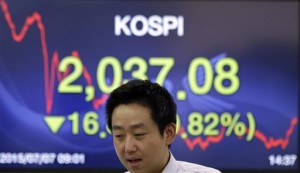Japan, Sydney stocks recover but Shanghai sell-off resumes

A currency trader walks by a screen showing the Korea Composite Stock Price Index (KOSPI) at the foreign exchange dealing room of the Korea Exchange Bank headquarters in Seoul, South Korea, Tuesday, July 7, 2015. Chinese stocks fell Tuesday despite official efforts to shore up slumping prices while other Asian markets were mixed after Greece’s spiraling crisis weighed on Wall Street. AP PHOTO/LEE JIN-MAN
HONG KONG–Japanese and Australian stocks bounced Tuesday from the previous day’s Greece-fueled sell-off, but Shanghai and Hong Kong sank again as analysts warned Chinese measures to staunch a recent mainland rout will likely not be enough.
The euro eased slightly but managed to hold its own after Greece’s weekend vote against creditors’ austerity proposals, with dealers hoping contagion will be limited if a bailout reform deal cannot be reached.
Crude prices edged up after taking a hammering Monday on demand fears owing to the Greek crisis and China’s struggles to stabilize its stock markets.
Tokyo rose 1.31 percent, or 264.47 points, to 20,376.59 and Sydney added 1.94 percent, or 106.40 points, to 5,581.40, but Seoul lost 0.66 percent, or 13.64 points, to end at 2,040.29.
Shanghai ended 1.29 percent lower, giving up 48.79 points to 3,727.12–although it managed to pare a fall of more than three percent at the open. Hong Kong lost 1.03 percent, or 260.97 points, to end at 24,975.31.
Eyes are on Europe, where Greece’s Prime Minister Alexis Tsipras will unveil new proposals Tuesday at a hastily arranged emergency eurozone summit in Brussels.
“It is now up to the government of Alexis Tsipras to make serious, credible proposals so that this willingness to stay in the eurozone can translate into a lasting program,” said French President Francois Hollande after crisis talks in Paris with German Chancellor Angela Merkel.
On Tuesday French premier Manuel Valls said “the basis for a deal exists,” adding that his country was “convinced that we can’t take the risk of Greece leaving the Eurozone,” a move that would affect economies across the globe.
And European Commission head Jean-Claude Juncker backed Greece’s continued membership of the euro, telling parliament in Strasbourg: “My wish is that a ‘Grexit’ should be avoided.”
With the country’s economy on the brink, Greece’s government has extended an eight-day bank closure until Thursday on fears cash machines will run dry.
The European Central Bank, which has been keeping lenders afloat, announced it would maintain a key financial lifeline, but turned the screw by raising the bar for them to access the emergency funds.
Analysts said investors are now in a wait-and-see mode.
China ‘fall-out’ risk
“I think it’s going to be hard to get any real traction until we get some type of clarity,” Walter Todd, a chief investment officer at Greenwood Capital Associates LLC in South Carolina, told Bloomberg News.
The euro dipped, buying $1.1015 and 135.13 yen in Tokyo Tuesday, compared with 1.1057 and 135.50 yen in New York.
The dollar was at 122.72 yen against 122.55 yen. Traders have edged out of the safe-bet yen as risk aversion subsides.
While US and European stocks slipped, the sell-off in leading markets was not painful.
On Wall Street the Dow eased 0.26 percent, the S&P 500 shed 0.39 percent and the Nasdaq dropped 0.34 percent.
Paris fell 2.01 percent and Frankfurt shed 1.52 percent, while London was 0.76 percent lower.
Shanghai volatility continues despite government measures at the weekend to halt initial public offerings (IPOs)–to stop liquidity drying up–and moves to pour billions of yuan into the market to end three weeks of plunging prices.
But analysts said the measures are not enough and would put pressure on Beijing as the economy struggles.
“The more resources authorities commit to propping up the stock market, the more they ratchet up the potential fall-out risks should the market continue to collapse,” said Andrew Wood, an analyst at BMI Research.
“This could give rise to a crisis of confidence in the authorities’ ability to support both the stock market and the real economy.”
Oil prices edged back slightly after plunging Monday, with fresh oversupply worries as Iran’s nuclear talks progress, raising the possibility sanctions on its exports could be removed.
US benchmark West Texas Intermediate for August delivery, which lost almost eight percent Monday, advanced 44 cents to $52.97 and Brent gained 54 cents to $57.08 after retreating more than 6.0 percent the day before.
Gold fetched $1,165.74 compared with $1,167.50 late Monday.
In other markets:
— Taipei was marginally lower, dipping 5.80 points to 9,250.16.
Taiwan Semiconductor Manufacturing Co. was unchanged at Tw$140.5 while Fubon Financial Holding closed 0.81 percent higher at Tw$62.0.
— Wellington rose 0.46 percent, or 26.56 points, to 5,803.18.
Air New Zealand was up 0.59 percent at NZ$2.565 and Spark lifted 0.18 percent to NZ$2.795.
— Manila closed 0.17 percent lower, shedding 12.50 points to 7,442.65.
Ayala Corp. fell 1.97 percent to 748 pesos, BDO Unibank dropped 0.94 percent to 105.50 pesos and SM Investments eased 0.17 percent to 880 pesos.
— Bangkok rose 0.72 percent, or 10.54 points, to 1,483.77.
Airports of Thailand gained 0.33 percent to 307 baht, while oil and gas producer PTT added 0.58 percent to 349 baht.
— Mumbai fell 0.13 percent, or 37.07 points, to end at 28,171.69.
Miner major Vedanta Limited fell 2.76 percent to 158.55 rupees, while Coal India gained 2.06 percent to 428.60 rupees.
— Malaysia dropped 0.28 percent or 4.75 points, to 1,712.30.
Maybank fell 0.44 percent to 9.15 ringgit, Telekom Malaysia lost 0.15 percent to 6.70 ringgit while Petronas Gas went down 0.09 percent to 21.40 ringgit.
— Singapore was up 0.24 percent, or 7.99 points, to close at 3,340.93.
United Overseas Bank rose 0.39 percent to Sg$23.38 and Singapore Telecom jumped 1.17 percent to Sg$4.32.
— Jakarta ended down 0.22 percent, or 10.69 points, at 4,906.05.
Property developer Pembangunan Perumahan gained 5.01 percent to 3,880 rupiah, while lender Bank Central Asia fell 2.94 percent to 13,200 rupiah.